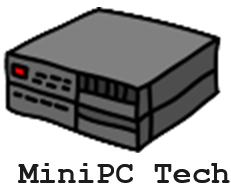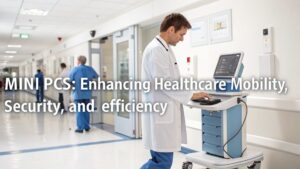Just as a scalpel’s precision transforms a surgeon’s capabilities, the right technology can revolutionize healthcare delivery. You’ve likely noticed how technology bottlenecks create frustration during patient care—delays that mini PCs are specifically designed to eliminate. From securing sensitive patient data to maximizing limited clinical space, mini pcs benefit healthcare professionals’ most pressing challenges. The following solutions demonstrate how these small devices make an outsized impact on your practice efficiency and patient outcomes.
Key Takeaways
- Mini PCs provide secure, encrypted access to electronic health records while ensuring HIPAA compliance through multi-factor authentication.
- Compact design allows mounting behind monitors or on mobile carts, optimizing clinical space and improving workflow mobility.
- Advanced processing capabilities support high-quality medical imaging and AI-accelerated diagnostics with 4K display output capability.
- Energy-efficient hardware enables robust telehealth infrastructure and continuous remote patient monitoring systems.
- Implementation reduces charting errors by 40% while improving interdepartmental collaboration and resource allocation.
Streamlining Patient Information Management With Enhanced Security
While healthcare facilities continuously battle security threats and information overload, mini PCs have emerged as powerful allies in revolutionizing patient information management. These compact systems provide constant, encrypted access to electronic health records at the point of care, ensuring you’ll always reference accurate patient histories and treatment plans.
Mini PCs transform healthcare by providing secure, point-of-care access to patient records when it matters most.
You’ll appreciate how these devices integrate seamlessly with hospital information systems, enabling synchronized patient data across departments. Their robust patient data encryption protocols comply with HIPAA regulations, establishing secure access parameters that align with role-based protection policies. Implementing multi-factor authentication adds an essential layer of protection against unauthorized access to sensitive patient information.
The fanless models prevent dust circulation, making them ideal for sterile environments like operating rooms. Healthcare professionals can rely on mini PC systems to reduce surgical site infection risks through this design feature. By consolidating digital records, you’ll eliminate paperwork while enhancing interdisciplinary coordination. Utilizing password managers can further strengthen your security posture by ensuring each healthcare professional maintains unique, complex credentials for accessing patient data systems.
Your medical carts equipped with mini PCs benefit healthcare workers as they become mobile data hubs, allowing real-time updates during rounds without compromising security. Their high performance capabilities effectively meet the demanding computational needs of modern healthcare applications without sacrificing mobility.
Space-Saving Design for Busy Medical Environments
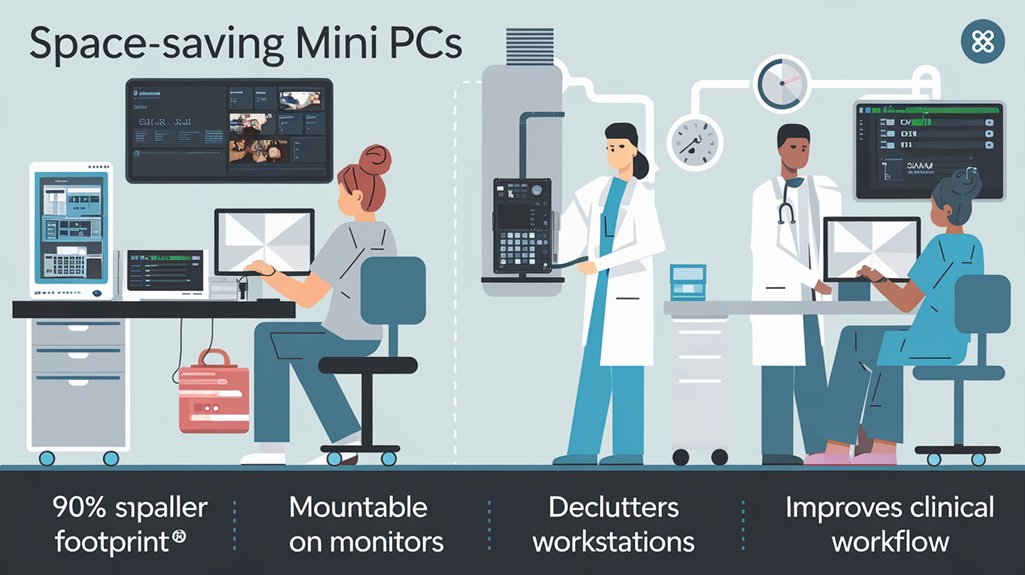
In today’s overcrowded healthcare facilities, mini PCs deliver exceptional space utilization through their book-sized form factor that dramatically reduces the desktop footprint required for computing infrastructure.
You’ll gain valuable surface area as these compact technology solutions can mount behind monitors, on walls, or attach directly to medical carts.
These space-efficient systems integrate seamlessly with mobility solutions while extending battery life through low power consumption. Their energy-efficient design supports continuous operation without draining resources in 24-hour healthcare environments. Their lightweight design improves cart maneuverability in busy corridors.
Fanless models prevent dust circulation in sterile environments, maintaining critical hygiene standards while operating quietly.
The enhanced security features provide robust protection for sensitive patient data while maintaining HIPAA compliance in all healthcare environments.
The efficient storage benefits extend beyond physical space—you’ll optimize workflow by creating room for additional monitors and medical devices while enabling ergonomic workstation arrangements.
This space optimization reduces costs by eliminating the need for expensive facility expansions.
Their advanced connectivity options ensure seamless integration with various medical equipment and diagnostic tools in modern healthcare settings.
Powering Advanced Medical Imaging and Diagnostics
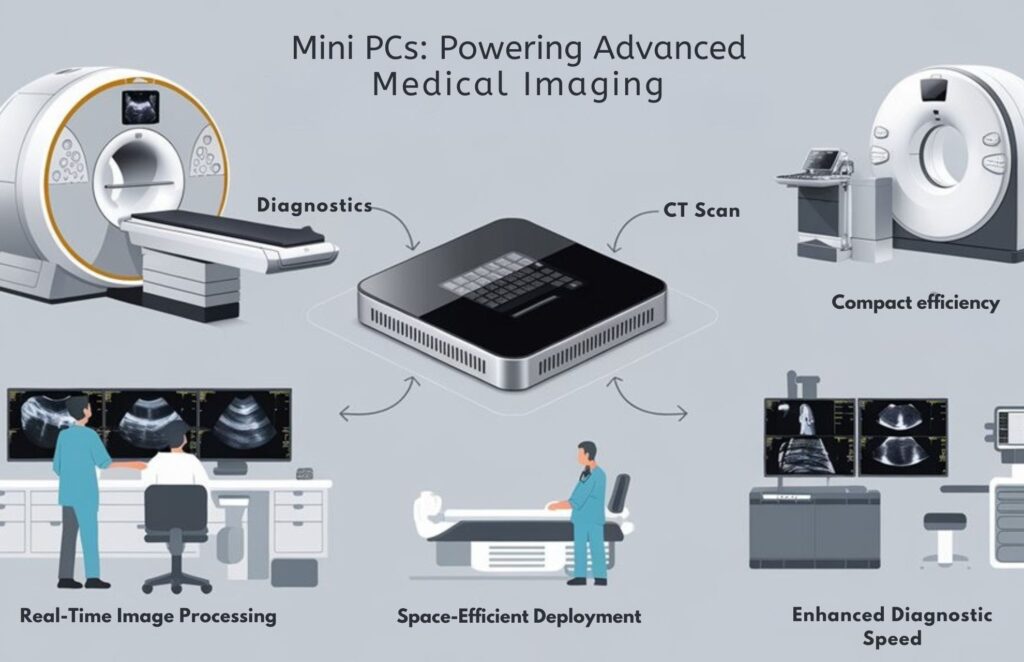
Modern mini PCs benefit healthcare workers by delivering desktop-grade imaging performance through powerful GPU architectures that transform medical diagnostics capabilities.
You’ll experience unprecedented GPU performance when processing complex MRI, CT, and X-ray datasets, with medical-grade imaging clarity that reveals the subtlest anatomical details. Our computers provide high-resolution displays for detailed visualization and accurate interpretation of medical images.
- Process large imaging files instantly with high-bandwidth memory systems that eliminate data transfer bottlenecks.
- Achieve superior diagnostic accuracy through AI-accelerated detection and segmentation algorithms.
- Visualize 3D reconstructions with ray tracing technology for enhanced spatial understanding.
- Reduce processing speed constraints with optimized CPU/GPU combinations that handle multiple diagnostic applications simultaneously.
These compact powerhouses support your most demanding imaging workflows while fitting seamlessly into space-constrained environments, ensuring you deliver faster, more accurate diagnoses without compromise. Mini PCs with OCulink ports enable connection to external GPUs for enhanced imaging performance when needed. Healthcare facilities should prioritize mini PCs with advanced GPUs for optimal performance in high-resolution medical imaging applications. The clock speed of modern mini PC processors directly impacts how quickly complex patient data can be analyzed and rendered.
Enabling Efficient Telehealth Solutions and Remote Care
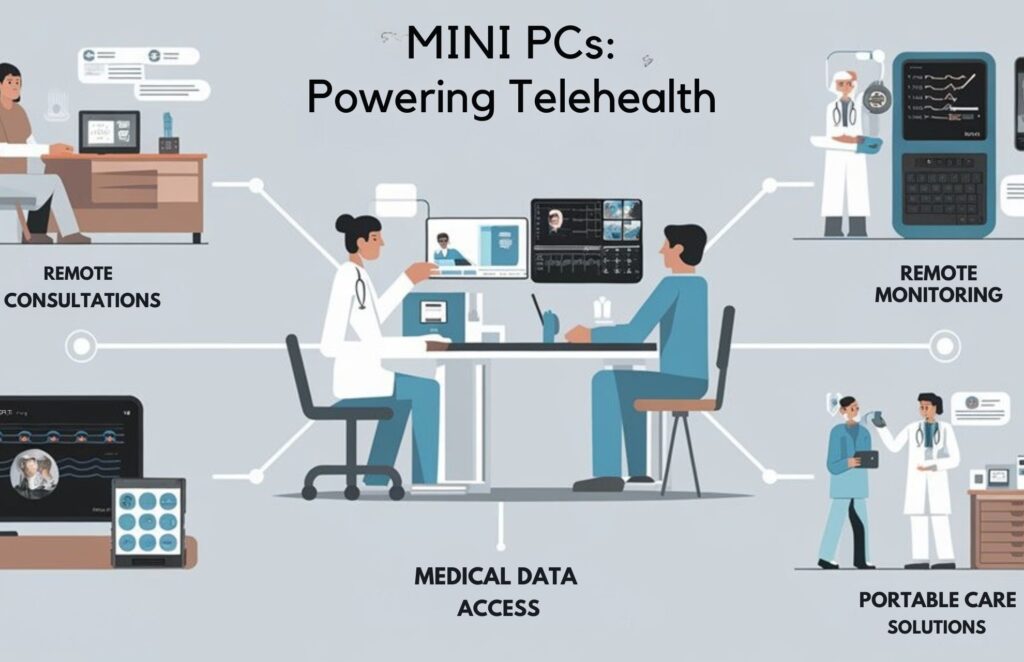
Beyond advanced imaging capabilities, mini PCs have transformed healthcare delivery through robust telehealth infrastructure that connects providers and patients across any distance. Mini PCs enable healthcare facilities to significantly reduce hospital readmissions by supporting continuous remote patient monitoring systems. You’ll achieve significant cost savings while improving care accessibility through these compact powerhouses that integrate seamlessly with existing equipment. These powerful devices provide energy efficiency compared to traditional desktop setups, making them ideal for 24/7 healthcare monitoring applications. Their compact size allows for discreet placement in patient rooms without disrupting the clinical environment.
| Telehealth Benefit | Mini PC Advantage | Outcome |
|---|---|---|
| Remote consultations | High-quality video streaming | Personalized care without physical contact |
| Patient monitoring | Integration with software like VeeOne Health | Rapid response to changing conditions |
| Deployment speed | Setup in hours vs. weeks | Quick adaptation during healthcare crises |
Your telehealth integration becomes remarkably more efficient with mini PCs that support analytical workstations while minimizing space requirements. By leveraging these portable systems, you’ll expand your practice’s reach to underserved communities while reducing infection risks and PPE needs.
Optimizing Medical Cart Mobility and Workflow
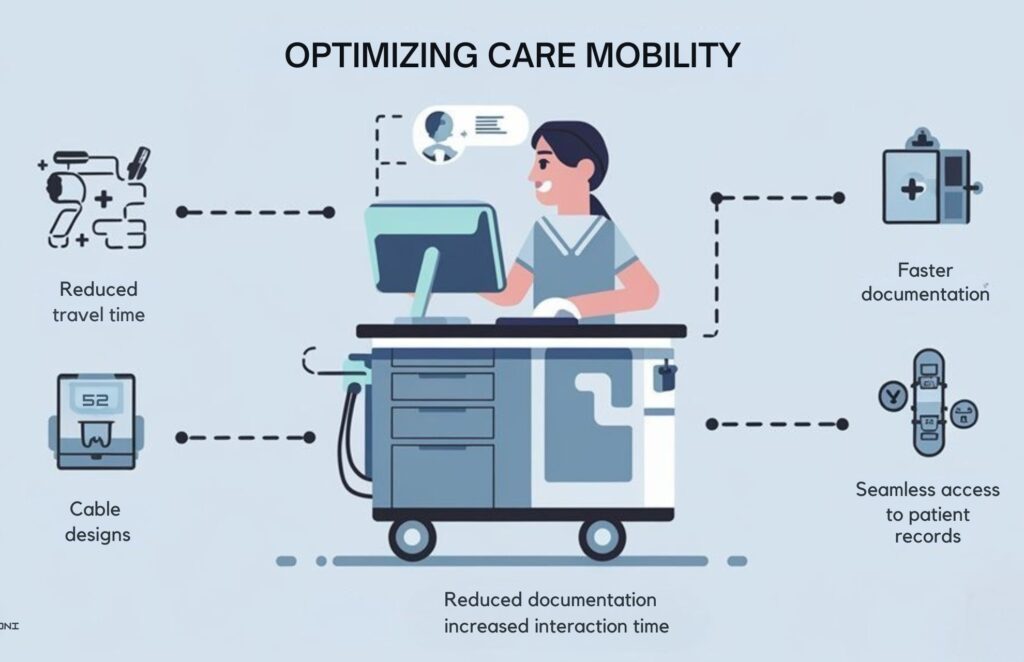
Medical staff efficiency dramatically improves when mini PCs are integrated into mobile cart solutions, creating lightweight, agile workstations that move seamlessly throughout healthcare facilities.
This mobile device integration transforms patient care through uninterrupted service delivery. These versatile workstations significantly reduce medical errors that cost the healthcare industry billions annually. With Intel UHD Graphics support for 4K display output, healthcare professionals can clearly view detailed medical imaging at patient bedsides.
Your workflow gains significant advantages with these strategic improvements:
- Continuous operation through hot-swappable batteries, eliminating downtime during critical care moments
- Enhanced bedside documentation with real-time communication capabilities that reduce charting errors by 40%
- Improved team collaboration as staff move freely between departments without workflow interruptions
- Streamlined equipment management with purpose-built carts that guarantee all necessary tools remain accessible
Mini PC-equipped carts feature adjustable height capabilities that prevent ergonomic strain for healthcare providers of varying statures during extended shifts.
Frequently Asked Questions
What Maintenance Schedule Do Mini PCs Require in Healthcare Settings?
Monitor daily for alerts, perform weekly antivirus scans and cleanups. Complete hardware upgrades every 3-6 months, maintain regular software updates, and verify BIOS settings to guarantee security compliance and operational reliability.
Are Mini PCs Compatible With Legacy Medical Software Systems?
You’ll find certain mini PCs are intentionally designed for legacy software compatibility. Look for models with Vortex86DX3 processors and versatile OS support to minimize compatibility issues with outdated medical applications.
How Long Is the Typical Lifecycle of a Mini PC in Healthcare?
Your mini PC’s typical lifecycle spans 4-6 years in healthcare settings. You’ll maximize this duration through strategic hardware upgrades, extending performance while adapting to evolving technological requirements in critical applications.
What Environmental Certifications Do Medical-Grade Mini PCs Hold?
Looking for healthier technology choices? Your medical-grade mini PCs hold UL60601-1/EN60601-1/IEC60601-1 certifications, IEC 60601-1-2 for EMC compliance, and IP ratings while exceeding Energy Star standards—reducing environmental impact through sustainability certifications.
Can Mini PCs Integrate With Hospital RFID Tracking Systems?
Yes, you’ll gain exceptional RFID integration capabilities with mini PCs, enhancing tracking accuracy through real-time data processing, specialized software solutions, and seamless network compatibility for asset management systems
Conclusion
Just as a skilled surgeon implements precise tools for ideal outcomes, you’ll find mini PCs serve as your digital scalpel in healthcare environments. They’ll secure your patient data behind encrypted walls while maximizing workspace in cramped exam rooms. Your diagnostic capabilities, telehealth solutions, and cart mobility will transform—creating a technical ecosystem where efficiency flows unimpeded, connecting each component of patient care into a seamless operational matrix.

I am a retired software engineer with experience in a multitude of areas including managing AWS and VMWare development environments. I bought a relative a mini-PC a year ago and have become passionate about the technology and its potential to change how we deploy software.
